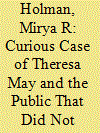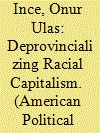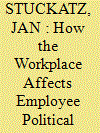|
|
|
Sort Order |
|
|
|
Items / Page
|
|
|
|
|
|
|
| Srl | Item |
| 1 |
ID:
184303


|
|
|
|
|
| Summary/Abstract |
Although democratic governance imposes temporal constraints, the timing of government policy making activities such as bill initiation is still poorly understood. This holds especially under coalition governments, in which government bills need to find approval by a partner party in parliament. We propose a dynamic temporal perspective in which ministers do not know whether they face a cooperative or competitive partner at the beginning of a term, but they learn this over time and use their agenda control to time further bill initiation in response. A circular regression analysis using data on more than 25,000 government bills from 11 parliamentary democracies over 30 years supports this temporal perspective, showing that ministers initiate bills later in the term when their previous bills have experienced greater scrutiny. Ministers further delay bill initiation when coalition parties’ incentives to deviate from compromise increase and when they have less power to constrain their bills’ scrutiny.
|
|
|
|
|
|
|
|
|
|
|
|
|
|
|
|
| 2 |
ID:
184296


|
|
|
|
|
| Summary/Abstract |
To analyze intersecting power relations in reproductive and immigration politics, I examine Garza v. Hargan (an appellate case regarding unaccompanied immigrant minors’ abortion rights) alongside systemic injustices in immigration detention (e.g., exposure to miscarriage risks, coerced sterilization, shackling). These injustices, I argue, emerge from conflicts and compromises over fetal citizenship within the American radical right. Although pro-life and anti-immigrant discourses assume opposing logics of citizenship, respectively interpreting immigrants’ fetuses as “fetal citizens” or “anchor babies,” these contradictions are neutralized by two techniques. Debilitation (systematic degradation of a disposable population) enables the appearance of fetal protection to coexist with de facto exposure to death, injury, and risk. Paralegality (quasi-legal policy making by enforcement agents) allows situational shifts in the meaning of fetal citizenship and adjustments to the pro-life/anti-immigrant compromise. Both obscure culpability for reproductive injustice, reinforce interlocking oppressions, and control women’s bodies in order to control the body politic’s demographic future.
|
|
|
|
|
|
|
|
|
|
|
|
|
|
|
|
| 3 |
ID:
184294


|
|
|
|
|
| Summary/Abstract |
This article presents the case for granting permanent residency to those experiencing significant risks throughout the COVID-19 pandemic to increase citizens’ safety. Increasing safety comes in many forms: directly, as when doctors, paramedics, and nurses assist patients, and indirectly, as when farmworkers produce life-sustaining food, garbage collectors protect sanitation, and social workers respond to emergency calls. A range of such workers are owed gratitude-derived duties from citizens that are best fulfilled via permanent residency. I defend this claim first for authorized migrants and then for unauthorized migrants, whose presence citizens would consent to if they were aware of the benefits they provide. Finally, I defend the claim that many frontline workers not owed gratitude are owed duties of justice, acquiring rights similar to those of permanent residency.
|
|
|
|
|
|
|
|
|
|
|
|
|
|
|
|
| 4 |
ID:
184300


|
|
|
|
|
| Summary/Abstract |
What are the origins of the ethnic landscapes in contemporary states? Drawing on a preregistered research design, we test the influence of dual socioeconomic revolutions that spread throughout Africa during the nineteenth and twentieth centuries—export agriculture and print technologies. We argue these changes transformed ethnicity via their effects on politicization and boundary-making. Print technologies strengthened imagined communities, leading to more salient—yet porous—ethnic identities. Cash crop endowments increased groups’ mobilizational potential but with more exclusionary boundaries to control agricultural rents. Using historical data on cash crops and African language publications, we find that groups exposed to these historical forces are more likely to be politically relevant in the postindependence period, and their members report more salient ethnic identities. We observe heterogenous effects on boundary-making as measured by interethnic marriage; relative to cash crops, printing fostered greater openness to assimilate linguistically related outsiders. Our findings illuminate not only the historical sources of ethnic politicization but also mechanisms shaping boundary formation.
|
|
|
|
|
|
|
|
|
|
|
|
|
|
|
|
| 5 |
ID:
184307


|
|
|
|
|
| Summary/Abstract |
Interest groups representing the marginalized regularly neglect advocacy on behalf of their most vulnerable constituents—those with intersectional disadvantage. Yet, they claim that such advocacy is central to their missions. I argue that interest groups representing women, people of color, Native nations, and the poor strategically conduct intersectional advocacy through coalitional lobbying. I test this claim using a new dataset of cosignature patterns within public comments on proposed federal agency rules submitted by a set of such groups between 2004 and 2014. I find that these groups are significantly more likely to pursue intersectional advocacy in coalitions but that coalition work, alone, does not relate to influential intersectional advocacy. Rather, it is particular coalition characteristics, including organizational diversity and financial capacity, that predict such influence. I conclude that collaborative lobbying is an effective tactic for mediating representational bias in interest group advocacy and promoting more pluralistic administrative policy making.
|
|
|
|
|
|
|
|
|
|
|
|
|
|
|
|
| 6 |
ID:
184301


|
|
|
|
|
| Summary/Abstract |
What functions does “collaboration” play in our moral and political practices and how did it come to play those roles? We use the term “collaboration” to identify a valued partnership, but it also names a morally compromised association and functions as a reason for blaming and punishing complicitous behavior. However, it has also played nefarious political roles: shoring up patriarchy, legitimizing ethnic cleansing, and bolstering a myth of national unity. “Collaboration” plays various roles because it is both ambiguous and vague. It is ambiguous in that there are multiple conceptions of collaboration, and it is vague because it contains borderline cases that are difficult, even impossible, to resolve. An exploration of “collaboration” combined with the history of its coming of age shows why its study is so vexing and how it functions in unexpected and disturbing ways.
|
|
|
|
|
|
|
|
|
|
|
|
|
|
|
|
| 7 |
ID:
184304


|
|
|
|
|
| Summary/Abstract |
Terrorist attacks routinely produce rallies for incumbent men in the executive office. With scarce cases, there has been little consideration of terrorism’s consequences for evaluations of sitting women executives. Fusing research on rallies with scholarship on women in politics, we derive a gender-revised framework wherein the public will be less inclined to rally around women when terrorists attack. A critical case is UK Prime Minister Theresa May, a right-leaning incumbent with security experience. Employing a natural experiment, we demonstrate that the public fails to rally after the 2017 Manchester Arena attack. Instead, evaluations of May decrease, with sharp declines among those holding negatives views about women. We further show May’s party loses votes in areas closer to the attack. We then find support for the argument in a multinational test. We conclude that conventional theory on rally events requires revision: women leaders cannot count on rallies following major terrorist attacks.
|
|
|
|
|
|
|
|
|
|
|
|
|
|
|
|
| 8 |
ID:
184298


|
|
|
|
|
| Summary/Abstract |
Recent literature on racial capitalism has overwhelmingly focused on the Atlantic settler-slave formation, sidelining the history of European imperialism in Asia. This article addresses this blind spot by recovering the aborted project of British settler colonialism in India through the writings of its most prominent advocate, John Crawfurd. It is argued that Crawfurd’s vision of a liberal empire in India rejected slavery and indigenous dispossession yet remained deeply racialized in its conception of capital, labor, and value. Crawfurd elaborated a “capital theory of race,” which derived racial categories from a civilizational spectrum keyed to the capitalist organization of production. His proposals accordingly revamped the conventional terms of colonization by representing India as overstocked with labor but vacant of capital and skill that only European settlers could provide. The article concludes with the broader implications of a transimperial analytic framework for writing connected histories of racial capitalism and settler colonialism.
|
|
|
|
|
|
|
|
|
|
|
|
|
|
|
|
| 9 |
ID:
184299


|
|
|
|
|
| Summary/Abstract |
A growing literature finds that nonviolence is more successful than violence in effecting political change. We suggest that a focus on this association is incomplete, because it obscures the crucial influence of ethnic identity on campaign outcomes. We argue that because of prevalent negative stereotypes associating minority ethnic groups with violence, such groups are perceived as more violent even when resisting nonviolently, increasing support for their repression and ultimately hampering campaign success. We show that, cross-nationally, the effect of nonviolence on outcomes is significantly moderated by ethnicity, with nonviolence increasing success only for dominant groups. We then test our argument using two experiments in the United States and Israel. Study 1 finds that nonviolent resistance by ethnic minorities is perceived as more violent and requiring more policing than identical resistance by majorities. Study 2 replicates and extends the results, leveraging the wave of racial justice protests across the US in June 2020 to find that white participants are perceived as less violent than Black participants when protesting for the same goals. These findings highlight the importance of ethnic identity in shaping campaign perceptions and outcomes, underscoring the obstacles that widespread biases pose to nonviolent mobilization.
|
|
|
|
|
|
|
|
|
|
|
|
|
|
|
|
| 10 |
ID:
184306


|
|
|
|
|
| Summary/Abstract |
Scholars and policy makers debate whether elites and citizens hold different views of the legitimacy of international organizations (IOs). Until now, sparse data has limited our ability to establish such gaps and to formulate theories for explaining them. This article offers the first systematic comparative analysis of elite and citizen perceptions of the legitimacy of IOs. It examines legitimacy beliefs toward six key IOs, drawing on uniquely coordinated survey evidence from Brazil, Germany, the Philippines, Russia, and the United States. We find a notable elite–citizen gap for all six IOs, four of the five countries, and all of six different elite types. Developing an individual-level approach to legitimacy beliefs, we argue that this gap is driven by systematic differences between elites and citizens in characteristics that matter for attitudes toward IOs. Our findings suggest that deep-seated differences between elites and general publics may present major challenges for democratic and effective international cooperation.
|
|
|
|
|
|
|
|
|
|
|
|
|
|
|
|
| 11 |
ID:
184293


|
|
|
|
|
| Summary/Abstract |
The relationship between anxiety and investor behavior is well known enough to warrant its own aphorism: a “flight to safety.” We posit that anxiety alters the intensity of voters’ preference for the status quo, inducing a political flight to safety toward establishment candidates. Leveraging the outbreak of the novel coronavirus during the Democratic primary election of 2020, we identify a causal effect of the outbreak on voting, with Biden benefiting between 7 and 15 percentage points at Sanders’s expense. A survey experiment in which participants exposed to an anxiety-inducing prompt choose the less disruptive hypothetical candidate provides further evidence of our theorized flight to safety among US-based respondents. Evidence from 2020 French municipal and US House primary elections suggests a COVID-induced flight to safety generalizes to benefit mainstream candidates across a variety of settings. Our findings suggest an as-yet underappreciated preference for “safe” candidates in times of anxiety.
|
|
|
|
|
|
|
|
|
|
|
|
|
|
|
|
| 12 |
ID:
184292


|
|
|
|
|
| Summary/Abstract |
How important is the workplace for employees’ political donations? Contrary to research on workplace political mobilization, existing work assumes that most individual donors contribute ideologically. I link donations of employees and Political Action Committees (PACs) from 12,737 U.S. public companies between 2003 and 2018 to show that 16.7% of employee donations go to employer-PAC-supported candidates. I investigate the dynamics between employee and PAC donations within firm–legislator pairs over time and find that both rank-and-file employees and executives contribute more dollars to company-supported politicians. Firm–employee donation alignment is stronger on powerful and ideologically moderate politicians with high value for the employer. Results from a difference-in-differences design further show modest changes in the partisan composition of employee donations after swift changes in the partisan donations of corporate PACs. The results suggest investment-related rather than ideological motives for alignment and highlight the importance of corporations for money in politics.
|
|
|
|
|
|
|
|
|
|
|
|
|
|
|
|
| 13 |
ID:
184291


|
|
|
|
|
| Summary/Abstract |
Epistemic hubris—the expression of unwarranted factual certitude—is a conspicuous yet understudied democratic hazard. Here, in two nationally representative studies, we examine its features and analyze its variance. We hypothesize, and find, that epistemic hubris is (a) prevalent, (b) bipartisan, and (c) associated with both intellectualism (an identity marked by ruminative habits and learning for its own sake) and anti-intellectualism (negative affect toward intellectuals and the intellectual establishment). Moreover, these correlates of epistemic hubris are distinctly partisan: intellectuals are disproportionately Democratic, whereas anti-intellectuals are disproportionately Republican. By implication, we suggest that both the intellectualism of Blue America and the anti-intellectualism of Red America contribute to the intemperance and intransigence that characterize civil society in the United States.
|
|
|
|
|
|
|
|
|
|
|
|
|
|
|
|
| 14 |
ID:
184295


|
|
|
|
|
| Summary/Abstract |
Most modern Western political theories embrace equal citizenship as a normative ideal. Many scholars, however, focus on “legal citizenship” and conceive of equal citizenship as uniformity of legal rights and duties. Others focus on experiences of “lived citizenship” and conceive of equal citizenship as achieving sufficient economic, political, and social standing for persons to be seen as civic equals. Using the United States as its example, this article offers a unifying framework for mapping the relationship of legal citizenship to lived citizenship. It illustrates the value of this framework by using it show why realistic efforts to achieve equal citizenship must aim for not uniform legal rights and duties but instead equity in the possession of economic resources, political representation, and social recognition among different categories of citizens.
|
|
|
|
|
|
|
|
|
|
|
|
|
|
|
|
| 15 |
ID:
184302


|
|
|
|
|
| Summary/Abstract |
The production of economic surplus, or “prosperity,” was fundamental to financing the rise of pristine civilizations. Yet, prosperity attracts predation, which discourages the investments required for civilization. To the extent that the economic footing of civilization creates existential security threats, civilization is paradoxical. We claim that, in addition to surplus production, civilizations require surplus protection, or “security.” Drawing from archaeology and history, we model the trade-offs facing a society on its path to civilization. We emphasize preinstitutional forces, especially the geographical environment, that shape growth and defense capabilities and derive the conditions under which these capabilities help escape the civilizational paradox. We provide qualitative illustration of the model by analyzing the rise of the first two civilizations, Sumer and Egypt.
|
|
|
|
|
|
|
|
|
|
|
|
|
|
|
|
| 16 |
ID:
184289


|
|
|
|
|
| Summary/Abstract |
Why are online discussions about politics more hostile than offline discussions? A popular answer argues that human psychology is tailored for face-to-face interaction and people’s behavior therefore changes for the worse in impersonal online discussions. We provide a theoretical formalization and empirical test of this explanation: the mismatch hypothesis. We argue that mismatches between human psychology and novel features of online environments could (a) change people’s behavior, (b) create adverse selection effects, and (c) bias people’s perceptions. Across eight studies, leveraging cross-national surveys and behavioral experiments (total N = 8,434), we test the mismatch hypothesis but only find evidence for limited selection effects. Instead, hostile political discussions are the result of status-driven individuals who are drawn to politics and are equally hostile both online and offline. Finally, we offer initial evidence that online discussions feel more hostile, in part, because the behavior of such individuals is more visible online than offline.
|
|
|
|
|
|
|
|
|
|
|
|
|
|
|
|
| 17 |
ID:
184305


|
|
|
|
|
| Summary/Abstract |
Constitutions empower people to ask judges for binding orders directing state agents to remedy rights violations, but state agents do not always comply. Scholars propose that by making it easier to observe noncompliance, courts can leverage public pressure for compliance when it exists. Yet, exposure to information about noncompliance might lead individuals to accept high levels of noncompliance and reduce support for judicial remedies. We estimate the rate of noncompliance with judges’ orders via a rigorous tracking study of the Colombian tutela. We then embed this rate in three survey experiments fielded with online national quota samples. We show that people find the noncompliance rate in the tutela highly unacceptable regardless of a variety of mitigating factors. We also show that public reactions to this information depend on prior expectations, a finding that stresses the importance of scholarship in cognitive psychology for studies of compliance in law and politics.
|
|
|
|
|
|
|
|
|
|
|
|
|
|
|
|
| 18 |
ID:
184297


|
|
|
|
|
| Summary/Abstract |
Mainstream feminist discourse typically defines rape culture as the normalization of aggressive male sexual violence against women, a definition that emerged out of radical feminist analysis of patriarchy in the 1970s but that does not reflect the intersectionality of sexual violence. I argue that conceptual analysis of rape culture must explore other dimensions of power in addition to patriarchy, such as white supremacy, heteronormativity, and capitalist exploitation. An intersectional analysis reveals how myths, discourses, and practices of rape culture sustain white male control over all subordinates of white heteropatriarchy by evolving and expanding to apply to any group that threatens white heteropatriarchal control. This essay traces the emergence of the idea of rape culture in the United States, offers an alternative intersectional account of rape culture, and uses this alternative account to analyze a 2013–14 news story involving Florida State University student and football player Jameis Winston and Florida State University student Erica Kinsman.
|
|
|
|
|
|
|
|
|
|
|
|
|
|
|
|
| 19 |
ID:
184308


|
|
|
|
|
| Summary/Abstract |
We challenge the prevalent claim that courts can only influence policy by adjudicating disputes. Instead, we theorize the shadow effect of courts: policy makers preemptively altering policies in anticipation of possible judicial review. While American studies imply that preemptive reforms hinge on litigious interest groups pressuring policy makers who support judicial review, we advance a comparative theory that flips these presumptions. In less litigious and more hostile political contexts, policy makers may instead weaponize preemptive reforms to preclude bureaucratic conflicts from triggering judicial oversight and starve courts of the cases they need to build their authority. By allowing some preemptive judicial influence to resist direct judicial interference, recalcitrant policy makers demonstrate that shadow effects are not an unqualified good for courts. We illustrate our theory by tracing how a major welfare reform in Norway was triggered by a conflict within its Ministry of Labor and a government resistance campaign targeting a little-known international court.
|
|
|
|
|
|
|
|
|
|
|
|
|
|
|
|
| 20 |
ID:
184290


|
|
|
|
|
| Summary/Abstract |
Whether powerful media outlets have effects on public opinion has been at the heart of theoretical and empirical discussions about the media’s role in political life. Yet, the effects of media campaigns are difficult to study because citizens self-select into media consumption. Using a quasi-experiment—the 30-year boycott of the most important Eurosceptic tabloid newspaper, The Sun, in Merseyside caused by the Hillsborough soccer disaster—we identify the effects of The Sun boycott on attitudes toward leaving the EU. Difference-in-differences designs using public opinion data spanning three decades, supplemented by referendum results, show that the boycott caused EU attitudes to become more positive in treated areas. This effect is driven by cohorts socialized under the boycott and by working-class voters who stopped reading The Sun. Our findings have implications for our understanding of public opinion, media influence, and ways to counter such influence in contemporary democracies.
|
|
|
|
|
|
|
|
|
|
|
|
|
|
|
|
|
|
|
|
|